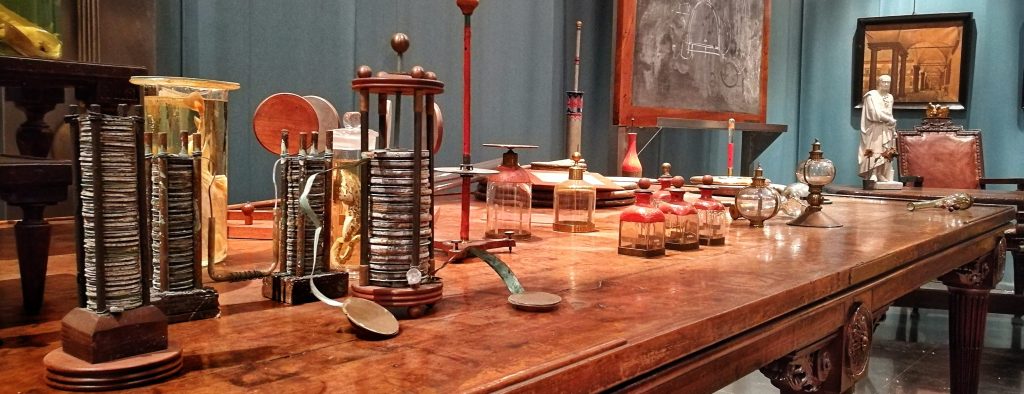
Worktable from the study room of Alessandro Volta
Inaugurated during the celebrations for the bicentenary of the invention of the battery (1999), the room houses a rich collection of instruments belonging to the original Physics Cabinet of Alessandro Volta, who, from 1778, taught experimental physics in Pavia.
On one side of the room, two work tables, belonging to Volta himself, display examples of the numerous instruments that he used to investigate the properties of the electric charge and of electrified bodies: electrophores, straw electroscopes and condenser electroscopes, electrometers, dischargers, Franklin plate capacitor (or Franklin Square) and conductors in various shapes.
You can also observe a few copies of Volta’s battery (the originals were destroyed in a fire in Como in 1899), various Leyden jars (single or in batteries), an electrostatic machine by Nairne, a couple of eudiometers, Volta’s pistols and an apparatus for the study of gas dilation (Volta determined the isobaric dilation law ten years before Gay-Lussac).
In the center of the room, two display cases contain mechanical and pneumatic instruments belonging to Ugo Foscolo highschool in Pavia: devices for the study of motion on an inclined plane and for the study of elastic collisions, pulleys, pumps, an intermittent fountain and a apparatus for evaluating air resistance. These are instruments purchased or built by Volta, which were transferred when, around the middle of the 19th century, a reform of the school systems assigned the teaching of mechanics to highschools instead of Universities.
The Cabinet collection is completed by displays showcasing instruments used for experiments in electrology (Lane and Leyden jars, lodestones, magnets, dry batteries), mechanics and thermology (a precision hydrostatic balance, Laplace and Lavoisier calorimeters, thermometers and barometers, a Newton tube), optics (mirrors, lenses, prisms, microscopes, a telescope). Two measuring standards are also on display: the meter and the kilogram, the latter also subject of interesting research concerning its special history.
